Rejoice Tapon is unsure which country she was born in or what month. She grew up in austere and dangerous conditions in the Sahara, surrounded by Boko Haram.
Today, Rejoice is US Navy Corpsman embedded with the US Marine Corps 7th Regiment Infantry Battalion. By 2033, she will be a surgeon.
This page features videos about her.
KUSI News Features Rejoice's message About Having Gratitude
Video interview
Six Videos in 2020
In 2020, traditional and social media became quite negative. The combination of the Coronapocolypse and George Floyd's death sent the USA into a downward spiral of negativity.
My wife, Rejoice Tapon, had enough of it. She's shy and dislikes public speaking, but she asked me to film her so she could get a few ideas off of her chest. These six videos sum up her thoughts.
Judging from shares, likes, and comments, most people appreciated Rejoice's 5 short videos.
But a few people were critical.
Here is an analogy that might help some of the critics understand Rejoice's point of view:
Imagine you spend a week hanging out with Elon Musk, Bill Gates, Barack Obama, Michael Jordan, Mark Cuban, Warren Buffett, Oprah, and a few more billionaires.
Imagine that throughout the week, you hear them complaining nonstop.
Some of their complaints are frivolous (e.g., 1st world problems), and some are serious (e.g., the racism they face or manic depression, or other health issues).
After a week of constant complaints, you may be urged to tell them, "I know you guys have problems, but sometimes you're acting like spoiled brats. You guys are billionaires! You are blessed! You're all better off today than when you were 20! Take a moment and appreciate your good fortune."
It's that same feeling that sparked Rejoice Tapon's desire to share her opinion on camera.
Yes, even poor Americans are "billionaires" in her eyes.
That's because Rejoice grew up in a far more cruel, unjust, and impoverished part of our planet.
As a little girl, Rejoice grew up in Houloum, Cameroon.

Houloum is a village in the Sahel.
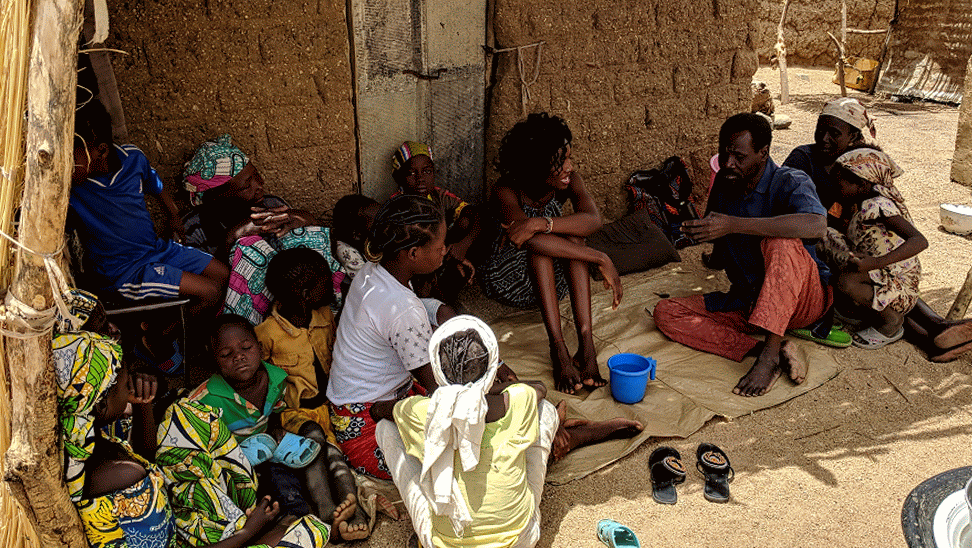
Houloum villagers gather around the star, Rejoice, because she's now considered a rich city girl.
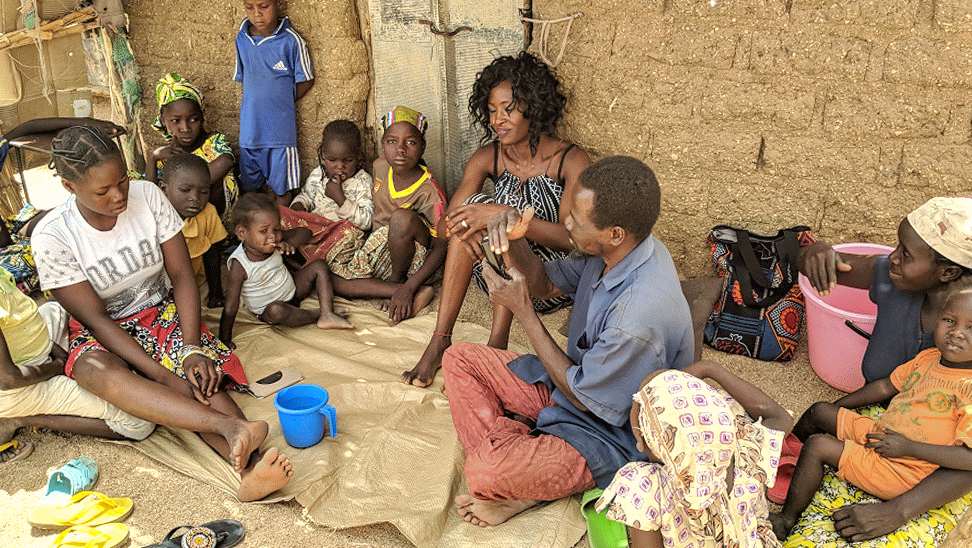
This is a typical gathering.
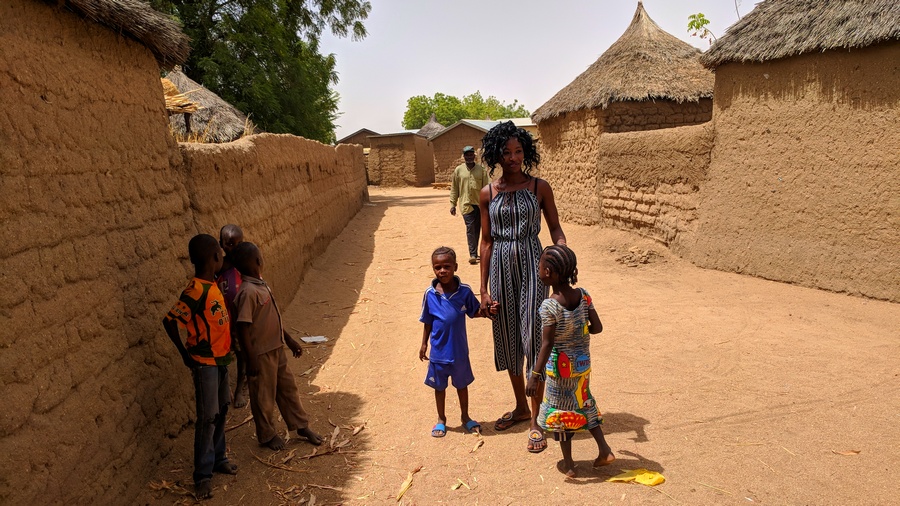
As the little girls around her, Rejoice was once a little girl who grew up in these same dusty streets.
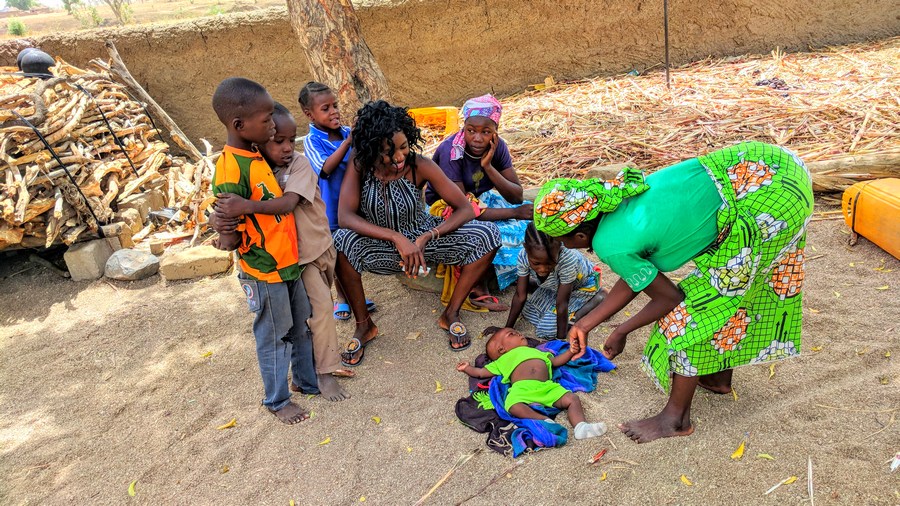
Villagers touch Rejoice's hair because they almost never see such hair styles in their village.
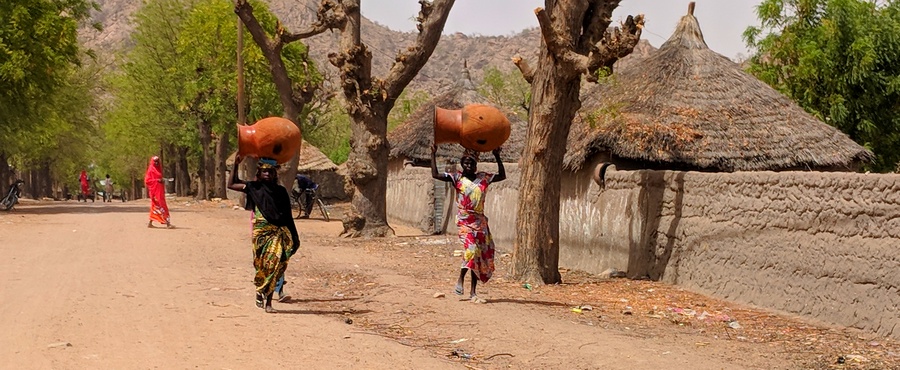
Life in Houloum has changed little over the centuries.
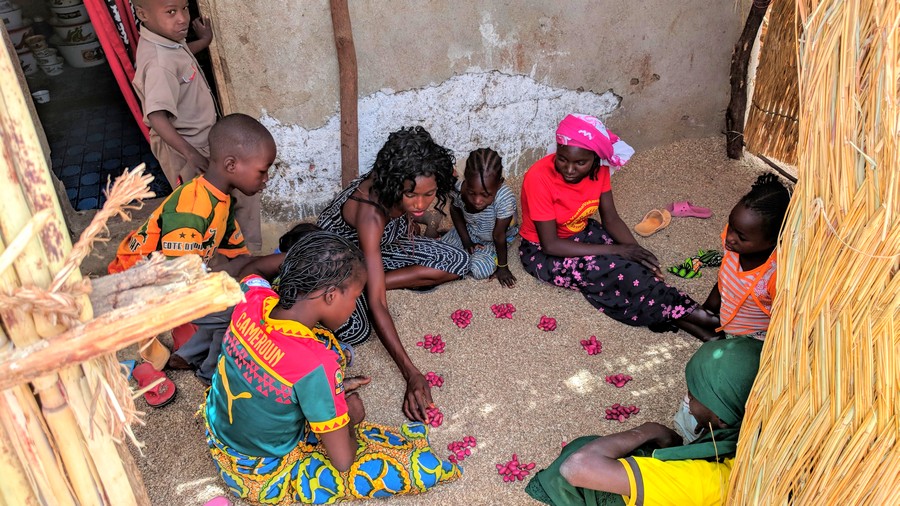
Cameroon has many villages like this.
She revisited it before coming to the USA.
Despite all their challenges (which dwarf our problems), Rejoice's village remains largely cheerful and upbeat.
When she came to America, she felt she had entered paradise; however, paradoxically, all the angels in paradise were complaining nonstop.
This made no sense to her.
Of course, she knows America has serious problems (just like billionaires have real problems too).
The common themes of her videos are:
- Be grateful
- Focus on the present, not the past
- Don't bathe in negativity
Rejoice's parents named her Binta.
She legally changed her name to Rejoice when she became an orphan at the lowest point of her life (when she became an orphan and Boko Haram threatened her with death).
There's a reason for that.
Think about it.
On the #BlackLivesMatter vs. #AllLivesMatter debate
How African Police Compare to American Police
Rejoice Tapon chuckles whenever she hears Americans complain about their police.
Listen to her experience in 31 African countries.
It may help you recalibrate your idea of what a nasty, evil police looks like in the 21st century.
Her speech does not mean that the United States should be satisfied with its police force.
She believes we can and should continually improve our institutions.
And there are some productive discussions and changes already happening regarding that.
Her point is to ask all of us to step back and be grateful for what we have.
Have gratitude that the US police forces are not only better than many other countries but they have improved over the last few decades and centuries.
So, take a deep breath, and show some profound gratitude.
Great!
Now go back to protesting and demanding that we abolish the police! Woo-hoo! ?
THINK Before Justifying Riots - Lesson from Boko Haram
In Nigeria, an imam named Muhammad Yusuf denounced the police and state corruption.
For 7 years, he led peaceful protests against the police and military.
He promised to bring justice and equality to Borno State.
His protests turned into violent riots and looting sprees.
Rioters justified their path of destruction by arguing that "we need a revolution."
Yusuf said they must abolish the police and replace it with a just and moral Caliphate.
They took over police stations.
Yusuf said it is impossible to have a revolution without a bit of death and destruction.
The collateral damage is unfortunate, but it's for the greater good.
And thus, Boko Haram was born.
When Rejoice Tapon heard some Americans defending looters, arguing that the 22 deaths were acceptable and the random property damage was justified, it gave her a visceral reaction.
It made her remember Muhammad Yusuf, Boko Haram's Founder, who lived five minutes from her house in Maiduguri.
When Rejoice heard Trevor Noah rhetorically ask, "Why wouldn't you loot Target?" she had enough.
Rejoice supports peaceful protests.
She agrees that policing must be improved.
The point of this video isn't to equate the George Floyd Rioters with Boko Haram! Duh.
Obviously, there are many differences.
Rejoice is simply condemning violent riots anywhere on this planet because she's seen how a society can quickly devolve into chaos when it begins to applaud destruction and death.
Indifference is also dangerous.
It's easy to support violent revolutions when they don't affect you.
Rejoice subscribes to MLK's beliefs (see MLK's 2nd quotation at the end of the video).
Remember, we've mounted many successful revolutions without violence, widespread destruction, and death (e.g., the Velvet Revolution, César Chávez's farmers' rights, gay rights & women's rights, India's independence, Eastern Europe shedding communism, women's suffrage, etc.)
Let's do it again!
An African Shows Her Appreciation for the USA
When Rejoice Tapon came to the USA in 2018, she didn't know how to multiply and divide. Although she had gone to school in Africa, she never learned the multiplication table. She never finished high school because Boko Haram turned her into a refugee.
In this 4-min speech, Rejoice talks about why she loves America.
It's a positive message to celebrate the 4th of July.
Rejoice chose her name when she was 13 years old.
You can guess why. She likes to focus on the positive.
She's faced greater challenges than you or me, but she always sees the glass as half full.
The USA has many shortcomings.
She knows it's imperfect.
She also knows that we've been steadily improving over many decades.
It's important to complain and demand better.
The USA wouldn't be as great if we were satisfied with ourselves in 1800 or 1900 or 2000.
Every once in a while, it's good to be grateful for what you have.
Gratitude doesn't equal complacency or indifference.
Gratitude is taking a short break in our never-ending quest to be a better human and make a better world.
During that short break, count your blessings.
Celebrate. Appreciate. Be grateful. Breathe.
Now didn't that feel good?
Great. Now let's get back to work!
A popular subject nowadays is talking about "white privilege."
Nobody is denying that it's real in the United States and beyond.
However, Rejoice Tapon teaches us that privilege and poverty are relative.
How you categorize those privileged and those poor depends on what population sample you are comparing that person (or group) to.
It also depends on what time era you compare yourself to.
For instance, on many metrics, a poor American beats a European King who lived in the Middle Ages.
After visiting 20 US states, including some impoverished zones, Rejoice concluded that poor Americans are blessed and privileged compared to the average African.
In America:
- Rejoice worked for minimum wage at a grocery store and did babysitting.
- She attended a California adult school full of poor people.
- She's been to poor neighborhoods and inside poor people's homes.
Watch and share this video to recalibrate our perception of privilege.
Does this mean we should not pity poor Americans?
No, that's not the point of this video.
It's meant to be an empowering and optimistic message.
It's meant to stir GRATITUDE in you (something that is in short supply recently).
We are all blessed.
BILLIONS of people would do ANYTHING to trade places with even the poorest Americans.
Yes, some Americans are more privileged than others, but if you were lucky to win the ovarian lottery and be born in a high-income country like the USA, then spend 5 minutes today being grateful.
You've got the rest of the day to feel depressed, angry, miserable, and hopeless.
An African Discusses Race and Racism in America
Rejoice Tapon shares her experience with racism in America.
Since some people are easily triggered, I'll preempt some of their criticisms:
- Rejoice has been to 20 states but has not been to the Deep South, where America's most overt racism exists. We'll go there one day. Nevertheless, she's seen an eclectic mix of the US. She's probably been to more of the US than most Americans.
- Although she's been to a wide variety of places in the USA, she's spent most of her time in the San Francisco Bay Area, the most politically correct zone in the USA. Some will argue that this has skewed her perspective. True. On the other hand, SF is not THAT different from most major American cities. And don't forget point #1 above.
- She has not suffered from systemic/structural/institutional racism. That doesn't mean that she doesn't believe it exists. It just means that she hasn't faced it personally. If you have personally suffered from such racism, share your story with her in the comments. She and others are listening.
- The reason she's sharing her point of view is because she's exasperated from hearing all the nonstop negativity on Facebook and in the news. She does not believe it's all doom and gloom. On the contrary, she's been pleasantly surprised that Americans are, on average, remarkably kind to all races. She believes that, on average, Americans are less racist than North Africans and Europeans (she's been to both regions). She has never been to Asia, but we're going there next.
As the Nigerian author and TED speaker Chimamanda Adichie said, "There's a danger to a single story."
This is Rejoice's story.
Share her story if you think diverse voices should be heard.
A Victim Rejects Victimhood - An African Perspective
It's hard to find a bigger victim than Rejoice Tapon. She:
- Grew up without electricity and plumbing.
- Had a mother who beat her every day.
- Narrowly escaped female genital mutilation.
- Was to be executed for being an Islamic Apostate at 12 years old.
- Escaped execution and child marriage at 13 years old by running away ALONE to another country.
- Was an orphan at 14 years old.
- Lived with a Boko Haram suicide bomber.
- Became a refugee as a teenager, thanks to Boko Haram.
- Had cops hounding her.
- Never graduated high school.
- Wasn't taught how to multiply or divide.
- Was sexually harassed by two of her Reverand Fathers.
- And more.
Think about those things when you watch this video, which is the final video in her 5-part series.
Understanding her background may help you to understand where she's coming from and what she's trying to say.
Rejoice’s videos tend to generate a few questions; here are responses to some that might come up:
- Rejoice rejects the notion that negative experiences or an unprivileged background are an excuse for underperforming today. Of course, such things can help explain your present situation, but, in her opinion, it doesn't determine your fate. She has overcome a lot. So can you.
- She believes it's essential to know one's history, but it's more important to move beyond it and create a new history.
- Her advice is for EVERYONE.
- Her last sentence is the most important: "Be grateful for what we have and keep improving ourselves. That's the only way to move forward."
- She certainly doesn't believe she is the biggest victim out there. Millions of people have had a much worse life than she has. And that's yet another thing she thinks about when she practices gratitude.
Speaking of people who have faced greater challenges than Rejoice, consider Nick Vujicic, who was born without arms and legs. He has overcome much and inspired armies.
Share this video if you think it will help shake someone stuck in a rut.
Slovenians ask Rejoice 3 questions
Modeling video
My TEDx Talk about her
If you want more videos about her, watch YouTube's Rejoice Tapon playlist.




